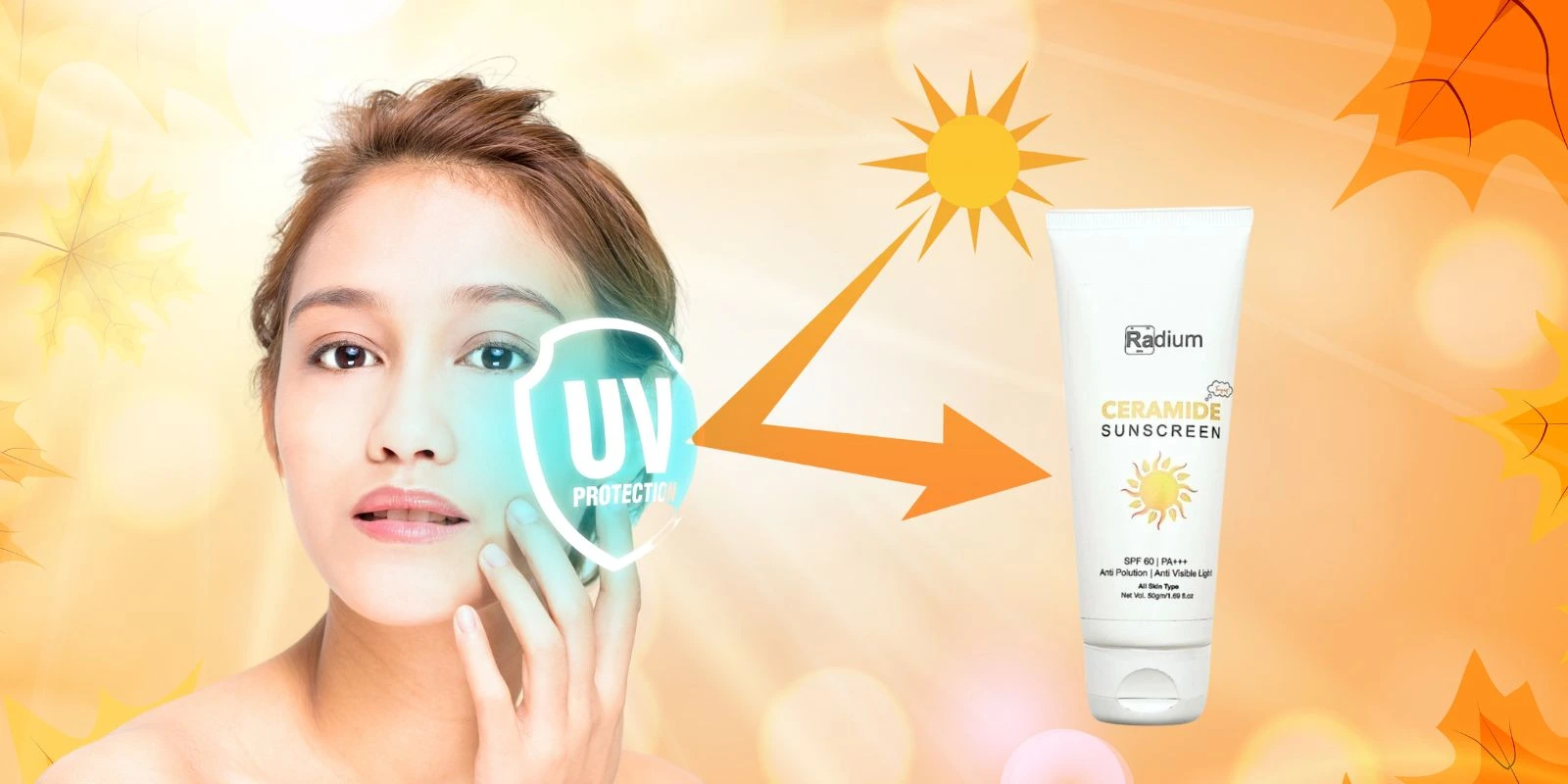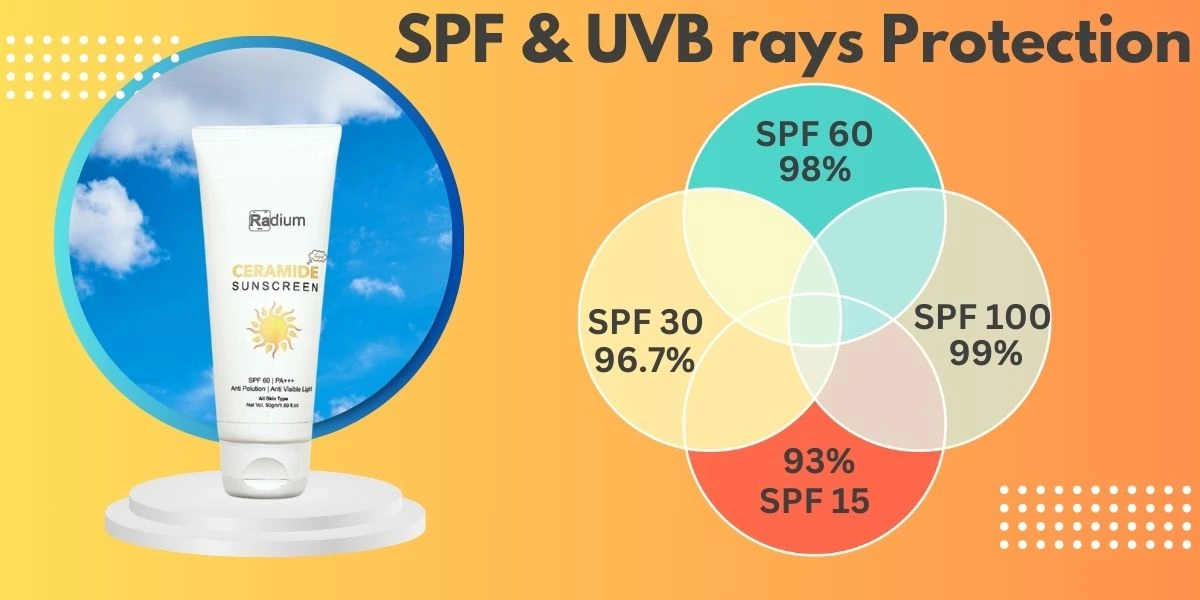
What is SPF? | Best SPF sunscreen & types of SPF
WHAT IS SPF AND WHAT DOES IT STAND FOR?
SPF stands for Sun Protection Factor, a measure of how well a sunscreen protects the skin from ultraviolet (UV) radiation. It is actually the amount of protection a sunscreen provides against UVB rays, which are the type of rays most responsible for causing sunburn and contributing to long-term damage to the skin, including increased risk of skin cancer. UVB rays can penetrate the skin’s surface and cause DNA damage, leading to burns and premature aging.
The SPF number tells you how much longer you can stay in the sun without getting burned when wearing sunscreen compared to not wearing any protection. For example, if you would normally burn after 10 minutes in the sun, applying an SPF 30 sunscreen would theoretically let you stay in the sun for 300 minutes (10 minutes multiplied by the SPF value) before burning, although this also depends on sweating, water exposure, and how much sunscreen is applied.
Generally, the higher the SPF, the more effective the sunscreen is in protecting against UVB rays. However, this does not mean that higher SPF offers a drastically better protection. For example, an SPF 60 sunscreen blocks about 98% of UVB rays The rest of the text remains the same.
, while SPF 100 blocks about 99%. Though it may seem insignificant, this still emphasizes the reapplication of sunscreen and its usage in conjunction with other sun-protective measures, such as seeking shade, wearing protective clothing, and avoiding prolonged sun exposure during peak hours.
Understanding SPF is vital for effective sun safety, as even mild sunburns can accumulate over time and lead to skin damage. Therefore, it’s recommended to choose a sunscreen with an appropriate SPF based on your skin type, the intensity of sun exposure, and your planned activities. Always remember, sunscreen should be applied generously and reapplied every two hours, or more often if you’re swimming or sweating.
What Does the SPF Number Mean?
Understanding UVA & UVB Rays
The sun gives off two kinds of harmful ultraviolet (UV) rays:
UVA Rays: Cause premature aging, wrinkles, and can contribute to skin cancer.
UVB Rays: Cause sunburn and play a key role in developing skin cancer.
SPF mainly measures UVB protection but it is important to use a broad-spectrum sunscreen that protects against both UVA and UVB rays.
How Does SPF Work?
Sunscreens protect your skin by either absorption or reflection of UV rays. Here are the two main types:
Physical (Mineral) Sunscreens: These may contain zinc oxide and titanium dioxide as ingredients. These ingredients function by reflecting UV rays away from the skin.
Chemical Sunscreens: Ingredients such as oxybenzone, avobenzone, and octinoxate have different functions. They absorb UV radiation and convert it into heat, thus not damaging the skin.

Choosing the Right SPF for Your Skin Type
The melanin level in your skin does not determine the amount of SPF that you need. Darker skin also needs protection from the sun. Here’s a general SPF guideline:
Dry Skin: Moisturizing ingredients should be found in SPF 30.
Sensitive Skin: Apply SPF 60 because the skin is more vulnerable to damage.
Mature Skin: SPF 60 is ideal for preventing aging and UV damage.
If you have skin conditions or concerns, consult a dermatologist to find the best SPF for you.
SPF 60 vs. SPF 30: Which One Should You Choose?
SPF 60 offers 98% UVB protection, and SPF 30 offers 96.7%. The difference is slight, but SPF 60 is preferable to those who easily get sunburned or who spend long periods outdoors. In general, SPF 30 should be adequate for everyday use as long as one applies the right amount.
Common Myths About Sunscreen
- Darker Skin Doesn’t Need Sunscreen – False! Melanin provides some protection, but not enough to prevent damage or skin cancer.
- Sunscreen is Only for Sunny Days – UV rays penetrate clouds and cause damage even on overcast days.
- Higher SPF Means You Don’t Need to Reapply – No SPF lasts all day. You must reapply every 2 hours.
- Sunscreen Prevents Vitamin D Absorption – Studies show that using SPF does not significantly reduce vitamin D levels.
- One Application is Enough for the Day – Reapplication is essential, especially if sweating or swimming.
Radium Ceramide Sunscreen: The Best SPF 60 Sunscreen for All Skin Types
Why Choose Radium Ceramide Sunscreen?
Radium Ceramide Sunscreen is more than a sunblock-it is a complete skincare essential that offers superior sun protection and skincare benefits:
✔ Broad-Spectrum Protection: Shields against UVA & UVB rays to prevent premature aging and sunburn.
✔ SPF 60 PA+++: High-level protection to keep collagen intact and prevent sun damage.
✔ Blue Light Protection: Protects from HEV (blue light) emitted by screens.
✔ Ceramides for skin repair: Strengthens skin barrier and water retention.
✔ Formula against pollution: This formula protects the skin from dust, harmful pollutants, and environmental aggressors.
✔ Moisturizing: yet non-greasy. It gets absorbed in a short time without leaving any kind of white cast.
✔ Anti-ageing: Protects against wrinkle formation and fine lines.
✔ Suitable for all skin: Dry, oily, or even sensitive skin.
Key Ingredients
Ceramides: Strengthen the barrier of the skin and retain all forms of moisture.
Zinc Oxide: Natural mineral for broad-spectrum UV protection.
Vitamin E: An antioxidant that fights free radical damage.
Aloe Vera Extract: Soothes and hydrates sensitive skin.
Hyaluronic Acid: Keeps skin moisturized all day long.
Titanium Dioxide: Reflects harmful UV rays.
How to Apply SPF Sunscreen Correctly
To get maximum sun protection, follow these steps:
- Wash your face and pat dry.
- Apply enough sunscreen to cover your face (approximately a nickel-sized amount).
- Distribute evenly across all exposed skin – face, neck, ears, arms, etc.
- Rub into the skin until absorbed.
- Wait 20 minutes before exposing yourself to the sun.
- Apply every 2 hours, and after swimming or sweating.
Pro Tip: Use sunscreen daily, even on cloudy days, for healthy, young-looking skin.
Where to Buy?
Final Thoughts
The primary purpose of using SPF is for preventing sun damage, premature aging, and even skin cancer. It is about finding the best sunscreen, like Radium Ceramide Sunscreen, that ensures protection while at the same time nourishing the skin. Add SPF to your daily skincare routine to keep your skin healthy, youthful, and protected every day!
Frequently ask questions (FAQs)
1) Is Radium Ceramide Sunscreen good for dry skin?
Yes! The ceramide-enriched formula strengthens the barrier function of the skin and maintains moisture for extended periods.
2) Can I wear sunscreen under makeup?
Yes, apply sunscreen prior to makeup application and wait for a few minutes for absorption.
3) Is sunscreen necessary in winter?
Absolutely! UV rays exist throughout the year and can also cause damage even in cold weather.
4) Does SPF cause breakouts?
Not if you opt for a non-comedogenic formula like Radium Ceramide Sunscreen.
5) Can I skip sunscreen if my moisturizer has SPF?
No! Layering a dedicated sunscreen provides the best protection.
6) What is SPF and why is it important?
SPF stands for Sun Protection Factor. It measures the ability of the sunscreen to prevent UVB rays from causing your skin to get sunburned. Using a sunscreen with the right SPF level is essential for protecting your skin from sunburn, premature aging, and cancer.
7) How does SPF moisturizer help benefit the skin?
SPF moisturizers serveapurposebeyond skin protection from the harmful UV rays.Theyhydrateyourskin and nourishittoo. Hyaluronic acid, glycerin, and ceramides aresomeof the activeingredients that help maintain moisture balance, ensuringhealthy and resilient skin.
8) Can SPF moisturizers prevent sunburns and photoaging?
Yes, these are a protection shield. This prevents sunburn by blocking the UV rays entering your skin. It also avoids photoaging by protecting the collagen and elastin fibers that keep your skin firm and smooth.
9) How often do I need to reapply SPF?
It’s best to apply SPF every two hours, especially if you go out, sweat, or swim. Reapplication will ensure the continuous protection from harmful UV rays.
10) Can I use SPF moisturizer if I have sensitive skin?
Yes, there are many SPF moisturizers specifically designed for sensitive skin and carry soothing ingredients like aloe vera and chamomile. So, look for products that carry the label as hypoallergenic and fragrance-free.
11) Does a higher SPF provide better protection?
Higher SPF values offer more protection, but no sunscreen can block 100% of UV rays. An SPF 30 blocks about 97% of UVB rays, while SPF 60 blocks about 98%. It’s important to apply sunscreen generously and reapply regularly.
12) Is SPF necessary on cloudy days?
Yes, UV rays can pass through clouds, so it is a must to wear SPF even on cloudy days for protection of the skin from possible damage.
13) Can I apply SPF moisturizer on my children?
Yes, but be sure to use products that are specifically designed for children’s sensitive skin. Seek out sunscreens with gentle, safe ingredients and avoid those containing harsh chemicals.